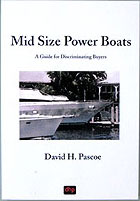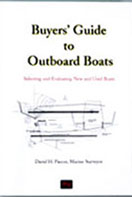Chapter 5
Excerpt
Of all marine investigation types, sinking investigations are the most commonly encountered. Therefore, this and the two following chapters cover the various elements involved as completely as reasonably possible within the confines of a single book. All three chapters are inter-related, but are kept separate to avoid confusion and maintain clarity.
Bilge Pumps
Bilge pumps are a critical element to any pleasure craft remaining afloat. All boats either have leaks or will develop leaks in the future. Moreover, many boats are not intended by design to keep all water out. In time, any boat without a bilge pumps will accumulate water and eventually sink.
This is the essential argument that boats cannot be seaworthy without such pumps. Indeed, the vast majority of pleasure craft sinkings occur while the vessel is unattended, and as a result of pumping system failure.
For this reason, complete evaluation of the pumping system must go hand-in-hand with determination of the source of water ingress. In all cases of sinking or flooding of a hull, the bilge pumps need to be tested for proper operation.
From an evidentiary standpoint, it is important to be able to prove or disprove whether any and all pumps were or were not functioning at the time of sinking. When investigating bilge pump issues, the system must be viewed as a whole, for these are systems that can be either simple or complex.
The central question in all boat sinkings is why the bilge pump(s) didn't keep the vessel afloat since that is the purpose of their existence: in most cases the bilge pumps should have kept the boat afloat, so the initial assumption will be that the pumping system has failed.
Therefore, the state of the pumping system at the time of sinking becomes a primary focus. The investigator will also need to establish the condition of the electrical system that powers the pumps, including the batteries and battery charger which runs off the shore power system, if there is one.
Correct assessment of the cause of the loss depends on determining whether the sinking was the result of a system failure, or the result of the pumping system being overwhelmed. Failure of the pumping system will be the proper assessment unless it can be demonstrated that the pumps could not be reasonably expected to discharge the amount of water entering the hull.
Pumping systems must necessarily be divided into two classes, those with charging systems and those without.
Absent electrical system failure, pumps in vessels with battery charging systems can more or less be expected to run indefinitely(1) so that the issue of whether the water ingress was a long-term or short-term event is less important than it is for a boat with no charging system. Pumps in vessels without charging systems will run only until the battery is depleted.
The significance of the distinction between the two as it may affect insurance coverage is that pumping system failure may be classified as an internal defect, whereas absent any system failure may be strictly the result of an external event.
Then there will be those cases where both circumstances were involved, so that we have a primary and a contributing cause. With insurance cases, the investigator will need to give very careful consideration to these factors in order to draw the correct conclusion, since the boat owner's insurance coverage will depend upon it.
(Additional spaces are added for easy screen reading.)
Table of Contents: Chapter Chapter 5
5. Bilge Pumps & Batteries 119
Bilge Pumps 119
Key Components 120
Types and Brands 123
Testing 124
The Battery Switch and Wiring 125
Float Switches 131
Bilge Pump Capacity Ratings 131
Water Leakage Rates 132
Pump Placement 132
The Bilge Pump Discharge 133
Conditions to Be Alert To 136
Testing Bilge Pump Capacity 137Batteries 138
Automotive Batteries 138
Storage or Deep Cycle Batteries 140
Marine 140
Deep-Cycle 141
Golf Cart 141
RV Batteries 141
Industrial Batteries 141
Gel Cells 142
AGM Batteries 142
Battery Ratings 143
Ampere-Hour Rating 143
Cold Cranking Amperage 144
Reserve Capacity Rating 144
"Maintenance Free" or Sealed Batteries 145
Dates and Codes 146
Battery Charging 146
Battery Banks 147
After Refloating 148
Critical Questions 148
Inspecting the Batteries 149
Battery Testing 149
Common DC System Faults 151
Battery Performance With Bilge Pumps 151
Rough Estimates 153
Natural Depletion Rates 153
| Expand Business! |
|---|
| Marine
surveyors: Expand your marine business! Conducting marine investigations can help free you from the limitations of a seasonal business and expand your business opportunities and income. |
| Who Hires? |
| Who
hires marine investigators? In addition to insurance companies, specialist investigators merge their specialized pleasure craft knowledge with investigative abilities for a broad range of clientele. |
| Clientele |
| These
can range from boat owners with serious warranty claim disputes and
faulty repair issues to being hired by lawyers as investigators as
either fact witnesses or expert witnesses. Marine investigators often work for boat owners who are having trouble with insurance claim issues, assisting the boat owner obtain a proper claims settlement. |
by David H. Pascoe
Soft Cover
544 pages
Publisher: D. H. Pascoe & Co., Inc.
Published: 2004
Language: English
ISBN-10:0965649652
ISBN-13: 9780965649650
In Stock
HOME >
David Pascoe - Biography
David Pascoe is a second generation marine surveyor in his family who began his surveying career at age 16 as an apprentice in 1965 as the era of wooden boats was drawing to a close.
Certified by the National Association of Marine Surveyors in 1972, he has conducted over 5,000 pre purchase surveys in addition to having conducted hundreds of boating accident investigations, including fires, sinkings, hull failures and machinery failure analysis.
Over forty years of knowledge and experience are brought to bear in following books. David Pascoe is the author of:
- "Mid Size Power Boats" (2003)
- "Buyers’ Guide to Outboard Boats" (2002)
- "Surveying Fiberglass Power Boats" (2001, 2nd Edition - 2005)
- "Marine Investigations" (2004).
In addition to readers in the United States, boaters and boat industry professionals worldwide from over 70 countries have purchased David Pascoe's books, since introduction of his first book in 2001.
In 2012, David Pascoe has retired from marine surveying business at age 65.
On November 23rd, 2018, David Pascoe has passed away at age 71.





